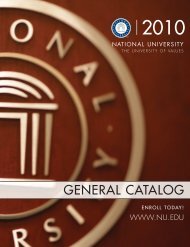Journal of Research in Innovative Teaching - National University
Journal of Research in Innovative Teaching - National University
Journal of Research in Innovative Teaching - National University
Create successful ePaper yourself
Turn your PDF publications into a flip-book with our unique Google optimized e-Paper software.
importance <strong>in</strong> society and <strong>in</strong> school. This universal power <strong>of</strong> story needs to be acknowledged as<br />
a potent source <strong>of</strong> cultural understand<strong>in</strong>g <strong>in</strong> all classrooms.<br />
The second implication addresses the need for a critical literacy stance <strong>in</strong> read<strong>in</strong>g and<br />
respond<strong>in</strong>g to multicultural literature. If students are expected to become socially responsible,<br />
teachers must help students explore views and topics that support and challenge their current<br />
th<strong>in</strong>k<strong>in</strong>g. The existence <strong>of</strong> multicultural literature <strong>in</strong> the classroom, therefore, is not enough.<br />
Students need to learn to analyze literature critically; question themselves to f<strong>in</strong>d out what they<br />
believe about race, class, and gender differences; and read literature closely to discern the<br />
mean<strong>in</strong>gs given to difference <strong>in</strong> our society (Fl<strong>in</strong>t, 2000). Blend<strong>in</strong>g read<strong>in</strong>g <strong>of</strong> multicultural<br />
literature with written responses and active discussions requires that students observe and<br />
appreciate other cultures, discover their own ethnic identity, question issues <strong>of</strong> diversity, and<br />
move toward more empathy and tolerance <strong>of</strong> others. Multiple forms <strong>of</strong> respond<strong>in</strong>g serve as a<br />
means to help students use the narrative to learn about and comment on their own histories as<br />
well as experience a range <strong>of</strong> emotions that may eventually affect how they understand, confront,<br />
and overcome any acts <strong>of</strong> prejudice, <strong>in</strong>tolerance, or racism they may encounter.<br />
The third implication <strong>of</strong> this study is the need for teachers to be adequately tra<strong>in</strong>ed <strong>in</strong><br />
critical literacy practices and <strong>in</strong> multicultural literature. This study represents an opportunity and<br />
challenge for colleges and universities to <strong>in</strong>clude the use <strong>of</strong> multicultural literature and critical<br />
literacy with<strong>in</strong> the required tra<strong>in</strong><strong>in</strong>g <strong>of</strong> educators. Good teach<strong>in</strong>g must be present if multicultural<br />
literature is to be valued and become a normal component <strong>of</strong> the read<strong>in</strong>g curriculum (Davis,<br />
Brown, Leidel-Rice, & Soeder, 2005; Powell, Cantrell & Adams, 2001). Know<strong>in</strong>g how to select<br />
literature and help children read aga<strong>in</strong>st the gra<strong>in</strong> <strong>in</strong> the literature is an important skill for all<br />
teachers. Multicultural literature and literature-related activities must be placed <strong>in</strong> the curriculum<br />
and teachers must be skilled <strong>in</strong> select<strong>in</strong>g this literature and <strong>in</strong> develop<strong>in</strong>g teach<strong>in</strong>g strategies that<br />
can be authentically used to accompany this literature. Teachers have the responsibility to teach<br />
us<strong>in</strong>g curricula <strong>in</strong> which diverse voices and stories are ma<strong>in</strong>streamed, rather than marg<strong>in</strong>alized.<br />
Fang, Fu, and Lamme (2000) wrote that teachers themselves need experience as analytical<br />
critical readers <strong>of</strong> multicultural text so that they can engage children <strong>in</strong> dynamic discussions<br />
about ideas and issues. Teachers must also be taught to engage <strong>in</strong> and facilitate the complex<br />
realities <strong>of</strong> facilitat<strong>in</strong>g good talks with children and realize that all students, even young children,<br />
are capable <strong>of</strong> engag<strong>in</strong>g <strong>in</strong> mean<strong>in</strong>gful and complex discussions <strong>of</strong> literature (Heffernan &<br />
Bergh<strong>of</strong>f, 2000; Möller, 2002; Shannon, 2002). Through the complexity <strong>of</strong> read<strong>in</strong>g aloud<br />
coupled with classroom discussions, teachers can become co-learners as dialogue about the<br />
mean<strong>in</strong>g <strong>of</strong> differences is left to the children.<br />
F<strong>in</strong>ally, this study highlights the need for classrooms that allow students the opportunity<br />
to respond to and act on their new understand<strong>in</strong>gs. There is a grow<strong>in</strong>g knowledge base <strong>of</strong> what<br />
critical literacy and teach<strong>in</strong>g for social justice means <strong>in</strong> real classrooms. Cultural appreciation is<br />
important, but it is not enough. Critical literacy is required to support a curriculum <strong>in</strong> which<br />
children explore, understand, and work toward end<strong>in</strong>g social <strong>in</strong>justice. Critical literacy teach<strong>in</strong>g<br />
and learn<strong>in</strong>g helps prepare students to be thoughtful and <strong>in</strong>formed world citizens who take on the<br />
personal <strong>in</strong>vestment <strong>in</strong> the well-be<strong>in</strong>g <strong>of</strong> others to truly become <strong>in</strong>volved members <strong>of</strong> a larger<br />
community.<br />
Literacy <strong>in</strong> the 21st century should <strong>in</strong>clude focus on global issues and problems as well as action<br />
that can help to resolve them. If we teach students to be literate without help<strong>in</strong>g them to develop<br />
a commitment to construct a just and humane world, we will foster a nation and world <strong>in</strong> which<br />
97

















